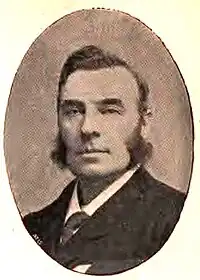George Trout Bartley
Sir George Christopher Trout Bartley, KCB (22 November 1842 – 13 September 1910) was an English civil servant, banker and Conservative politician who sat in the House of Commons from 1885 to 1906.

Biography
Bartley was born at Stoke Newington, the son of Robert Bartley and his wife Julia Anne Lucas. He was educated at Clapton, London and University College School.[1] He entered public service and worked for twenty years at the Science and Art Department, becoming Assistant Director. He was interested in poverty and social issues and published works on education and on building self-reliance He supported technical education, and was treasurer of the Society of Arts. He established a Penny Bank, which became the National Penny Bank.[2] He was a J.P. for Middlesex and Westminster.[1]
Trout Bartley stood for parliament in Hackney at the 1880 general election, but was unsuccessful.[3] He was elected as Member of Parliament (MP) for Islington North at the 1885 general election and held the seat until his defeat in 1906.[4] He announced that he would stand again when a suitable opportunity arose,[5] and contested the Kingston upon Hull West by-election in November 1907. The intervention for the first time of a Labour Party candidate cut the Liberal majority, but not by enough for Bartley to win the seat, and after his defeat in Hull he did not stand for Parliament again.[6]
He was a member of the Traffic Commission and travelled extensively. He was in South Africa when the Second Boer War broke out in 1899.
He was appointed a Knight Commander of the Order of the Bath (KCB) in the November 1902 Birthday Honours list,[7][8] and was invested with the insignia by King Edward VII at Buckingham Palace on 18 December 1902.[9]
Family
In 1864, Bartley married Mary Charlotte Cole the daughter of Henry Cole superintendent of the Science and Art Department. They had four sons. Their son Captain Stanhope Cole Bartley Royal Artillery was KIA 12/03/1916.
Publications
- A Square Mile in the East End 1870
- Schools for the people 1871
- Provident Knowledge Papers 1872
- The Seven Ages of a Village Pauper 1874
- The Parish Net, How it is Dragged and what it Catches 1875
- Enthusiasm 1888
References
- Debrett's House of Commons and Judicial Guide 1886
- A North London Leaders: Historic families, Ancestral estates 1907
- Craig, F. W. S. (1989) [1977]. British parliamentary election results 1832–1885 (2nd ed.). Chichester: Parliamentary Research Services. p. 11. ISBN 0-900178-26-4.
- Craig, F. W. S. (1989) [1974]. British parliamentary election results 1885–1918 (2nd ed.). Chichester: Parliamentary Research Services. p. 24. ISBN 0-900178-27-2.
- London leaders : historic families, ancestral estates. London: Allan North. 1907. pp. 334–337.
- Craig, 1885–1918, page 130
- "Birthday Honours". The Times. No. 36921. London. 10 November 1902. p. 10.
- "No. 27499". The London Gazette. 28 November 1902. p. 8253.
- "Court Circular". The Times. No. 36955. London. 19 December 1902. p. 4.
External links
 Works by or about George Trout Bartley at Wikisource
Works by or about George Trout Bartley at Wikisource- Hansard 1803–2005: contributions in Parliament by George Trout Bartley